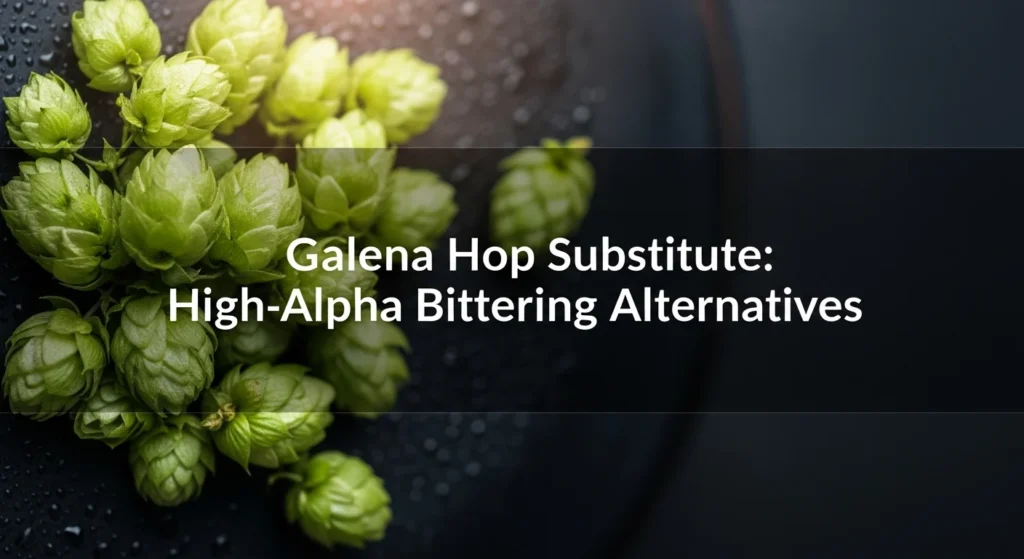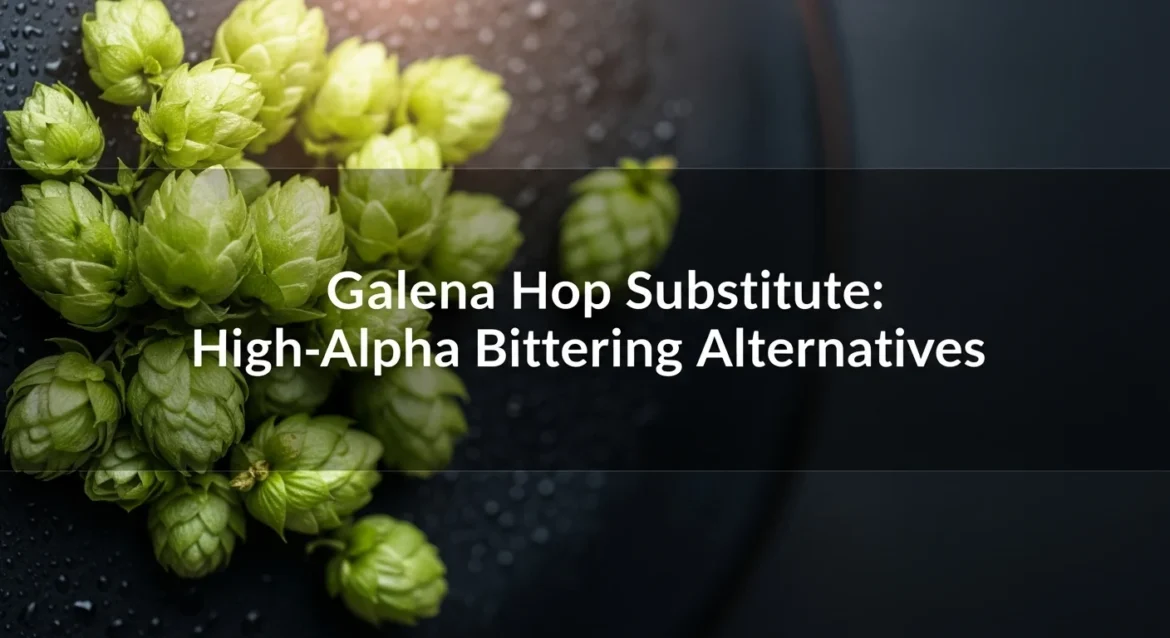Discover the 7 best Galena hop substitutes for clean, efficient bittering – find perfect high-alpha alternatives that deliver smooth bitterness in 2025.

Running low on Galena hops right before a big brew day? I’ve been there countless times over my 16 years of brewing, usually when I’m planning an IPA or stout that needs solid, clean bittering without excessive hop character in the finished beer.
Finding the right Galena hop substitute matters because this workhorse American hop brings efficient bittering (12-14% alpha acids) with pleasantly neutral character that lets other hops or malt flavors shine through without interference.
I’ve tested every common Galena alternative across IPAs, stouts, and American ales to understand how different high-alpha substitutes perform. Some matched remarkably well for clean bittering, others added unexpected character, and a few taught me when neutral bitterness matters versus when bittering hop flavor actually improves the beer.
This guide breaks down seven proven substitutes based on real brewing experience, complete with IBU calculations, style-specific recommendations, and strategic usage approaches so you’re never stuck scrambling on brew day.
Understanding Galena Hop Character Profile
Galena delivers clean, mellow bitterness with moderate fruity and spicy aromatics that make it one of America’s most versatile bittering hops. Developed by the USDA breeding program in Idaho and released in 1978, this hop descended from Brewer’s Gold through open pollination.
The alpha acid content ranges from 11.5-15%, positioning Galena as a high-alpha dual-purpose hop effective for both bittering and aroma applications. According to Yakima Valley Hops, the oil composition includes 40-60% myrcene and 10-17% humulene creating its characteristic clean bittering with subtle fruit notes.
What I appreciate about Galena is its neutral bittering quality that doesn’t interfere with other hops. You get clean bitterness with hints of pear, pineapple, and subtle citrus that work beautifully when you need IBUs without dominant hop flavor overshadowing delicate aroma additions.
The flavor profile sits comfortably between aggressive American hops and ultra-clean German bittering varieties. According to Beer Analytics, Galena shows moderate earthy aroma with subtle floral undertones and notes of stone fruit and blackcurrant.
When formulating a Galena hop substitute strategy, I focus on three elements: high alpha acid content for efficiency, clean bittering without harsh astringency, and neutral character that doesn’t compete with specialty hop additions.
Direct Single-Hop Replacements
Nugget: Classic American Bittering
Nugget provides excellent Galena replacement with similar alpha acids (12-14%) and complementary flavor profiles featuring woody-earthy notes with pine character. This versatile hop works across all brewing stages and maintains clean bittering quality.
The key difference is Nugget’s slightly more pronounced woody character versus Galena’s fruit notes. When using home brewing equipment with precise hop additions, Nugget shines particularly well in American ales where moderate hop presence complements rather than dominates.
Usage adjustment: Direct 1:1 substitution for IBUs
Best applications: Bittering additions, American IPAs, stouts
Columbus/Tomahawk/Zeus (CTZ): High-Alpha Powerhouse
Columbus delivers intense bittering capacity with 14-18% alpha acids offering more potency than Galena. This American variety provides clean bitterness with subtle citrus and resinous character that works well in hop-forward styles.
I’ve found Columbus particularly effective in double IPAs and imperial stouts where high bitterness levels benefit from fewer hop additions. According to Brew Your Own Magazine, Columbus has become a favorite high-alpha hop for aggressive American styles.
Substitution ratio: Reduce quantities by 15-20% due to higher AA
Ideal styles: DIPA, imperial stout, American strong ale
Magnum: Clean German Efficiency
Magnum brings ultra-clean bittering at 12-15.5% alpha acids with virtually no aroma contribution. This German variety (also grown in America) offers neutral bitterness perfect for styles where you want IBUs without hop flavor interference.
Reddit brewing communities consistently report that Magnum provides the cleanest bittering available in modern brewing, making it ideal when other hops handle all aroma duties.
Flavor profile: Neutral, subtle spice, very clean
Best usage: Pure bittering, lagers, any style needing clean IBUs
Strategic High-Alpha Alternatives
Warrior: Super-Alpha Bittering
Warrior delivers exceptional bittering efficiency at 15-18% alpha acids with smooth, resinous character. This super-alpha variety provides clean bitterness while contributing subtle lemon and floral notes when used in late additions.
According to brewing forums, Warrior has become a favorite for brewers seeking the cleanest possible bitterness with minimal cohumulone harshness that can create rough bitterness.
Usage notes: Reduce quantities 20-25% versus Galena
Applications: Any style requiring high IBUs, clean character
Chinook: Dual-Purpose Alternative
Chinook offers versatile high-alpha character at 12-14% alpha acids with pronounced pine and citrus aromatics. While less neutral than Galena, Chinook works excellently when you want bittering hops to contribute flavor complexity.
Substitution ratio: 1:1 for bittering, adds more aroma
Best styles: American pale ale, IPA, porter
Millennium: Smooth Modern Bittering
Millennium provides refined bittering at 15.5-18.5% alpha acids with mild herbal aromatics. This modern variety descended from Nugget offers smooth bitterness without the harsh edge sometimes found in older high-alpha hops.
Flavor profile: Floral, fruity, herbal, smooth
Usage: Bittering in ales, American styles
IBU Calculation and Usage Adjustments
When substituting hops for bittering, calculate IBU contributions carefully since alpha acid percentages directly impact bitterness levels. Use brewing software or online calculators to adjust quantities for equivalent bitterness.
Alpha Acid Adjustment Formula
To maintain equivalent IBUs when substituting:
New Hop Weight = (Original Hop AA% / Substitute Hop AA%) x Original Hop Weight
For example: Recipe calls for 1 oz Galena at 13% AA, substituting with Columbus at 16% AA:
- (13 / 16) x 1 oz = 0.81 oz Columbus needed
Cohumulone Considerations
Cohumulone percentage affects bitterness harshness. Galena contains 34-40% cohumulone, which some brewers believe creates harsher bitterness at high levels. When substituting, consider:
- Magnum (20-30%): Smoother than Galena
- Warrior (20-25%): Very smooth bittering
- Columbus (28-35%): Similar to Galena
- Nugget (22-26%): Smoother profile
| Hop Variety | Alpha Acid Range | Cohumulone % | Bitterness Character | Best Usage |
|---|---|---|---|---|
| Galena | 11.5-15% | 34-40% | Clean, moderate | General bittering |
| Nugget | 12-14% | 22-26% | Clean, woody | American ales |
| Columbus | 14-18% | 28-35% | Strong, resinous | High-IBU beers |
| Magnum | 12-15.5% | 20-30% | Ultra-clean | Any style |
| Warrior | 15-18% | 20-25% | Very smooth | Imperial styles |
| Chinook | 12-14% | 29-34% | Piney, citrus | Dual-purpose |
Style-Specific Substitution Strategies
American IPAs and Pale Ales
Nugget or Columbus work best for American hop-forward styles where you want solid bittering supporting aromatic hop additions. Use 60-minute additions for backbone bitterness, reserving flavorful hops for late additions.
For modern hazy IPAs, consider using Warrior or Magnum for ultra-clean bittering that doesn’t interfere with huge late-addition and dry-hop character defining the style.
Stouts and Porters
Magnum excels in dark beer styles where you want bitterness balancing roasted malt without adding hop flavor that might clash with chocolate and coffee notes. Target 30-50 IBUs depending on substyle.
The neutral character allows roasted malt complexity to shine while providing necessary bitterness balance that prevents overly sweet or cloying character in finished beer.
Imperial and High-Gravity Beers
Warrior or Columbus deliver efficient bittering for imperial stouts, barleywines, and double IPAs where high gravity requires elevated IBUs. Their high alpha acids reduce total hop material needed.
This efficiency matters in high-gravity brewing where excessive hop material can create green or vegetal flavors that detract from clean bitterness and beer quality.
Lagers and Pilsners
Magnum provides ideal lager bittering with neutral character supporting crisp malt profiles. German brewing traditions favor Magnum for authentic pilsner and helles where hop presence should be subtle.
Target 25-40 IBUs for pilsners using single bittering addition at 60 minutes, finishing with noble hops for authentic German lager character and refined hop aroma.
Brewing Process Optimization
First Wort Hopping with Substitutes
First wort hopping (FWH) with high-alpha hops creates smoother perceived bitterness than traditional 60-minute additions. Nugget, Magnum, and Warrior all perform excellently in FWH applications.
Add hops to kettle during runoff, allowing extended contact time that produces integrated bitterness with less harsh astringency than aggressive boil additions create in finished beer.
Bittering Addition Timing
Traditional 60-minute additions work best for maximum isomerization and IBU extraction. For smoother bitterness, try 45-minute additions that sacrifice slight efficiency for improved bitterness quality.
Some brewers report 90-minute additions with high-alpha hops create harsher bitterness, though this remains controversial among brewing professionals and experienced homebrewers.
Whirlpool Considerations
While primarily bittering hops, Galena substitutes can add character in whirlpool at 170-180°F. Columbus and Chinook work particularly well, contributing citrus and pine notes without excessive bitterness extraction.
Use 0.5-1.0 oz per 5 gallons for subtle aroma contribution that complements rather than dominates specialty aroma hop additions in late brewing stages.
Cost-Effectiveness and Availability
Economic Bittering Strategies
Magnum and Warrior offer excellent value for high-volume bittering needs. Their high alpha acids mean less material required, reducing overall hop costs in recipes requiring substantial IBUs.
For budget-conscious brewing, buying 1-pound packages of bittering hops during fall harvest season saves 25-40% versus small packages, especially for frequently brewed styles requiring consistent bittering.
Year-Round Availability
Galena substitutes maintain better availability than trendy aroma varieties. Magnum, Nugget, and Columbus remain consistently stocked at homebrew shops and online suppliers throughout the year.
I keep vacuum-sealed 1-pound bags of Magnum and Warrior frozen as insurance against supply issues, ensuring bittering hops never delay brew days or force last-minute recipe changes.
Quality Control and Storage
Proper Hop Storage Methods
Vacuum sealing and freezing maintains alpha acid levels for 18-24 months when stored at 0°F or below. High-alpha hops show less degradation than aroma varieties, maintaining bittering potential longer.
Label packages clearly with variety, alpha acid percentage, and purchase date. Recalculate IBUs if using older hops, as alpha acids degrade approximately 15-25% annually at room temperature.
Evaluating Hop Freshness
Fresh bittering hops smell mildly resinous and slightly sticky when rubbed between fingers. Oxidized hops develop cheese or cardboard aromas signaling degraded lupulin unsuitable for quality brewing.
Check packages regularly for air infiltration. Vacuum-sealed bags showing air pockets should be used quickly or resealed to prevent continued alpha acid degradation and bitterness loss.
Frequently Asked Questions
What’s the closest substitute for Galena hops?
Nugget provides the most similar profile with comparable alpha acids (12-14%) and related bittering characteristics. Use at 1:1 ratios for equivalent IBU contributions in most beer styles.
Can I use Cascade for bittering instead?
Cascade works but requires 2-3x quantities due to lower alpha acids (5-7%). This creates different flavor profiles with prominent citrus notes versus Galena’s neutral character, changing beer character significantly.
How do I calculate IBU adjustments?
Use the formula: (Original AA% / New AA%) x Original Weight. For 1 oz Galena at 13% replaced with Warrior at 16%, you’d need (13/16) x 1 = 0.81 oz Warrior.
Does bittering hop choice affect flavor?
Extended boiling drives off most hop aromatics, but some character remains. Magnum provides cleanest bittering, while Columbus and Chinook contribute subtle flavor even in 60-minute additions.
What’s the best high-alpha hop for clean bitterness?
Magnum and Warrior consistently rank highest for neutral, clean bittering without harsh astringency or unwanted hop flavor interfering with other beer components.
Can I substitute with lower-alpha hops?
Yes, but you’ll need significantly more material. Using Fuggle (4-5% AA) instead of Galena requires 3x the weight, which may create vegetal flavors and haze issues.
Do substitutes work in lagers?
Absolutely – Magnum is specifically ideal for lagers where neutral bittering supports crisp malt character without hop flavor interference. German brewers favor Magnum for authentic pilsner brewing.
Making Your Final Selection
Choosing the right Galena hop substitute depends on understanding your beer style requirements and bittering goals. Nugget offers the closest match with minimal adjustment, while Magnum provides ultra-clean character for any style.
Don’t hesitate to experiment with combinations – my best imperial stout uses 60% Warrior and 40% Columbus for complex bittering that creates depth without harshness. Detailed brewing notes help identify successes worth repeating.
Remember that hop substitution involves both mathematics and brewing intuition. We can calculate exact IBU contributions, but how bittering hops perform depends on water chemistry, boil vigor, and process variables only you control through systematic brewing practice.
View missing ingredients as opportunities for process improvement. Stock multiple high-alpha alternatives so you’re always prepared, and taste critically to understand how different bittering hops affect your finished beers across various styles.
Start with these proven substitutions, calculate carefully, then adjust based on results. That hands-on experience with bittering hop characteristics becomes invaluable knowledge supporting decades of efficient, high-quality brewing with optimal bitterness profiles.
About the Author
Sophia Chen holds a Ph.D. in Biochemistry and applies her scientific expertise to the art of brewing, specializing in hop chemistry and alpha acid analysis for optimal bittering. After working in quality control for a major craft brewery focused on hop-forward beers, Sophia now consults with homebrewers on optimizing hop selection and IBU calculations for specific beer styles.
Her analytical approach to understanding alpha acid degradation, cohumulone ratios, and isomerization efficiency helps demystify the science behind bittering hop selection, making complex brewing chemistry accessible to hobbyists seeking precise control over bitterness profiles. When not conducting laboratory analysis of hop compounds or performing side-by-side bittering trials with different high-alpha varieties, Sophia enjoys teaching water chemistry workshops and developing systematic approaches to hop substitution that maintain consistent IBU levels across recipe variations. Connect with her at [email protected] for more insights on brewing science, hop chemistry, and precision bittering calculations.

